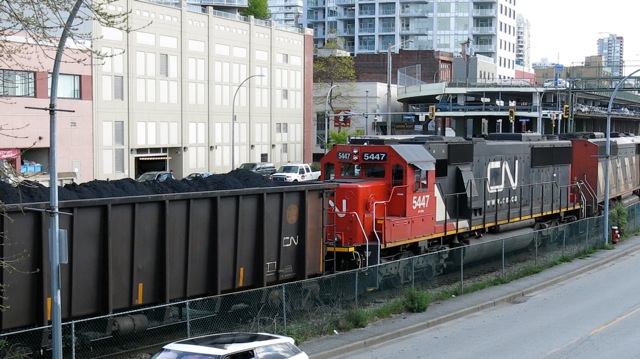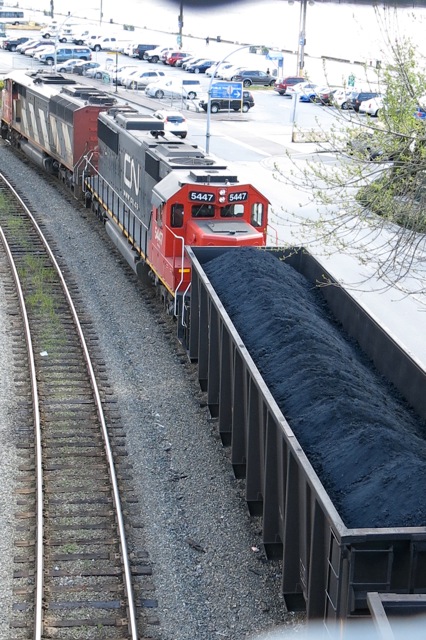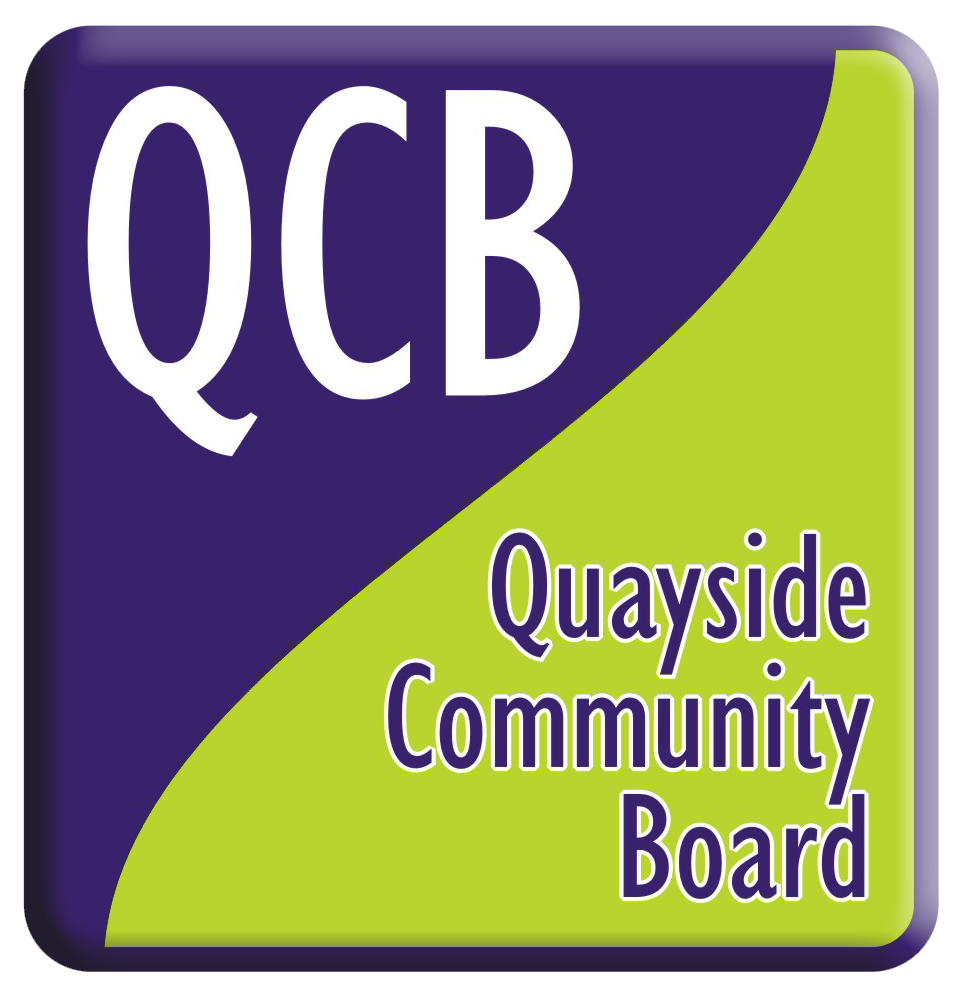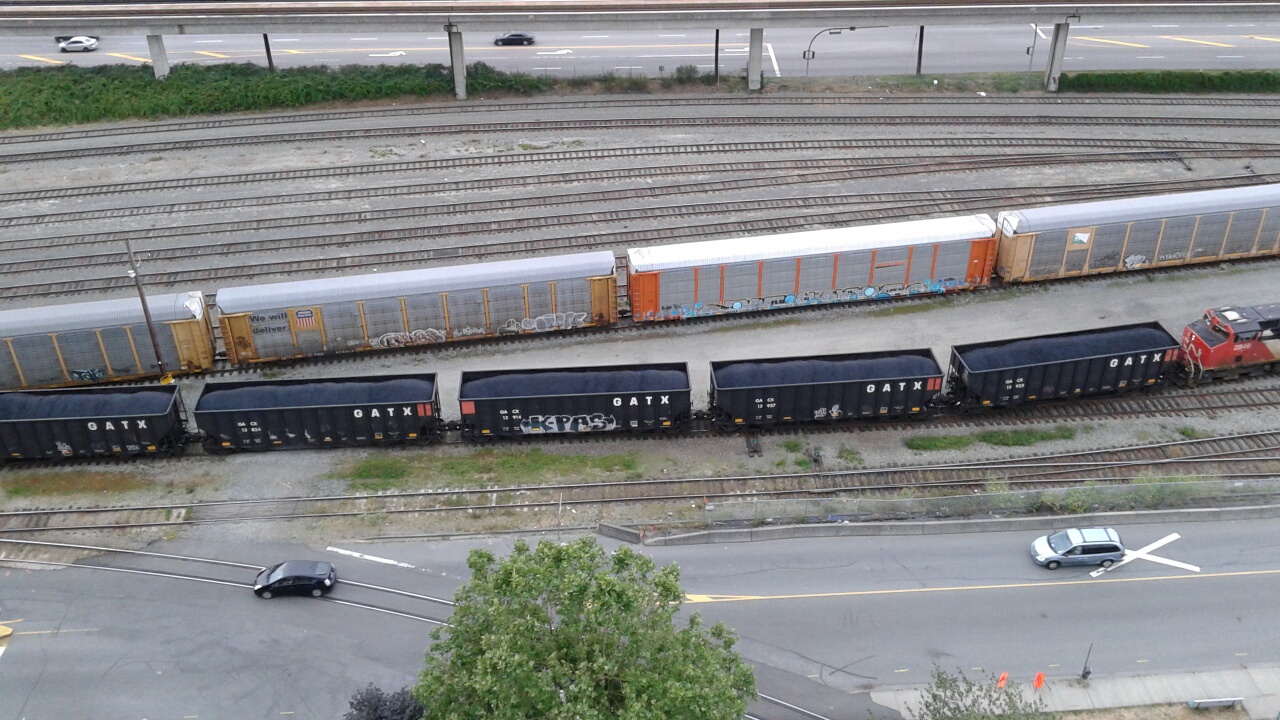PHOTO: Maureen Albanese Taken July 13, 2017 early am
A July 6, 2017 article by Quay Resident and RECORD NEWS Reporter Theresa McManus served to address a Quay concern over coal trains/containers running through our community. In a Q&A format, Theresa invited Mark Allison, the city’s manager of strategic initiatives and sustainability, to answer the question posed by Don Northrup.
QUESTION:
“I have seen on a couple of occasions rail cars heading east across Begbie carrying what looks like coal. I am not as well informed as I should be on such things and I just wondered if anybody knew what is going on?” he asked. “I don’t know if they are doing coal across the river like they were going to do at Fraser Surrey Docks.” [article excerpt]

ANSWER:
Taking an excerpt from Allison’s reply, Mark states: “The railways have main lines and shunting yards running through Quayside, so there can be loaded and empty coal cars moving through the area, but to the best of my knowledge there is no trans-shipment [QCB note: see end of post for Wikipedia definition of trans-shipment] of coal to any port facility through this part of New Westminster. Trains run at very slow speed in this area and loaded coal cars would have a topping agent applied to minimize dust emissions. Coal is currently being shipped from the port’s Neptune facility in North Vancouver and Roberts Bank facility in Delta.”

The QCB has to admit that with the photo evidence collected by Quay residents as recently as July 13, 2017 (see above) that coal is absolutely being shipped in open containers through our community. As leaders in the protest against the proposed coal facility at FSD and having staged the first protest against coal at FSD and moving through our community (with then Councillor Coté and the Raging Grannies), the QCB believes where it goes and how it gets there is irrelevant to the fact that dirty coal is being shipped through our community.
Research on the shipment of coal by rail reveals how open container coal has ruined natural environments and has created health issues such as breathing issues. It is such an environmental issue that USA Ports on the West Coast have refused to accept it – thus the proposal at FSD to handle US mined coal in Canada.
The QCB wants to make sure that there is no ‘shade’ thrown onto the discussion of coal vs New West and the Quay. Coal is most certainly being transported through New West in open containers thus jeopardizing our health and environment. Coal – if it must be mined and shipped – should be done so in closed containers and not be transported through vibrant communities with high concentration of residents.
Of course, in a perfect world the QCB would like to have no coal shipments through our community but that is not in the cards for the near future. But if it must go through our City then the QCB would encourage the City to take the lead to ensure it is done so in sealed closed containers, further ‘minimizing dust emissions’ which are a detriment to healthy living in New West.
The QCB would like to acknowledge Mr. Northrup for keeping this crucial and important Quay issue in the news.
Wikipedia.org Definition: Transshipment
Transshipment or transhipment is the shipment of goods or containers to an intermediate destination, then to yet another destination.
One possible reason for transshipment is to change the means of transport during the journey (e.g., from ship transport to road transport), known as transloading. Another reason is to combine small shipments into a large shipment (consolidation), dividing the large shipment at the other end (deconsolidation). Transshipment usually takes place in transport hubs. Much international transshipment also takes place in designated customs areas, thus avoiding the need for customs checks or duties, otherwise a major hindrance for efficient transport.
An item handled (from the shipper’s point of view) as a single movement is not generally considered transshipped, even if it changes from one mode of transport to another at several points. Previously, it was often not distinguished from transloading, since each leg of such a trip was typically handled by a different shipper.
Transshipment is normally fully legal and an everyday part of world trade. However, it can also be a method used to disguise intent, as is the case with illegal logging, smuggling, or grey-market goods.

